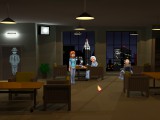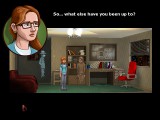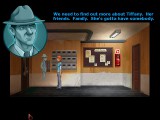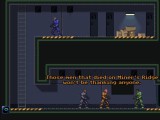Start spreadin’ the news / I’m leavin’ today / I want to be a part of it / New York, New York
These vagabond shoes / are longing to stray / Right through the very heart of it / New York, New York
From 2006 to 2009, Wadjet Eye Games‘ “Blackwell” adventure game series provided three fantastic gaming events, each more popular than the last. The series finally culminated in 2009’s magnificent “Convergence”, which bordered qualitatively on those mid-90’s classics with its sense of place, atmosphere, intrigue and immersion.
The fourth part, The Blackwell Deception, now included in the ongoing Indie Royale “Fall Bundle”, was quite the cause célèbre in 2011, with most reviewers finding it “must-play” for existing fans, and an apt enough continuation of the para-normal puzzler series.
I both agree and disagree with this sentiment. Doubtless “Deception” is a great, great adventure game. Next to the rest of the series, however, it is also Dave Gilbert’s weakest professional effort to date (even if Richard Cobbett thought it best!). Although very finely tuned as always, “Deception” had one major, inherent flaw.
 The earlier Blackwell adventures, though fairly conventional, even rigid in their own right, had nevertheless managed to wow gamers with their intangibles over the generic – character dynamics, lifelike portrayals of human beings (and ghosts!), and New York City, of course. Everything seemed to align with “Convergence”, which was a total, all-around package in every respect. Here was “Deception”, then, sandwiched in-between the hyped releases of Gemini Rue and Resonance, two of the best retro adventures of the decade. Expectations were running undoubtedly high.
The earlier Blackwell adventures, though fairly conventional, even rigid in their own right, had nevertheless managed to wow gamers with their intangibles over the generic – character dynamics, lifelike portrayals of human beings (and ghosts!), and New York City, of course. Everything seemed to align with “Convergence”, which was a total, all-around package in every respect. Here was “Deception”, then, sandwiched in-between the hyped releases of Gemini Rue and Resonance, two of the best retro adventures of the decade. Expectations were running undoubtedly high.
And for a solid while at the beginning, “Deception” seems to affirm its place. Only after the game begins to bog itself down, case after case reminiscent of the previous episodes, does a hard truth begin to dawn on the player: “Deception” has the rather curious distinction of being both the longest and least interesting Blackwell episode to date.
The major flaw that I hinted at before is this: “Deception” feels almost entirely self-contained. Gilbert’s masterful treatment of the overarching Blackwell, uh, saga(?) has always been the real meat of the series – yet for the very first time, the game’s narrative goes nowhere fast.
 It’s not what’s in “Deception” that disappoints, but what isn’t: Rosangela and Joey’s relationship, so reliant on Gilbert’s knack for writing, is left hanging. A new schism between the two is hinted at but never quite developed. Neither is Joey’s secret past, even if the game’s marketing orbits around this very concept. Another major character - NYC - is also largely absent. The city simply doesn’t figure in the storyline so much as in the previous episodes. This is a great shame. While these omissions are understandable, there simply is rather little narrative reward in “Deception”.
It’s not what’s in “Deception” that disappoints, but what isn’t: Rosangela and Joey’s relationship, so reliant on Gilbert’s knack for writing, is left hanging. A new schism between the two is hinted at but never quite developed. Neither is Joey’s secret past, even if the game’s marketing orbits around this very concept. Another major character - NYC - is also largely absent. The city simply doesn’t figure in the storyline so much as in the previous episodes. This is a great shame. While these omissions are understandable, there simply is rather little narrative reward in “Deception”.
Perhaps the game’s episodic, generic case-based structure finally caught up with its story? Be it as it may, more cases and more ghosts is not always better. Imagine that – a paranormal detective with a bad case of déjà vu! Most players will probably not feel too demotivated by the repetitive structure, however, as each Blackwell sticks to its case-based generic formula, after all. It’s just that “Deception” is drawn-out where the others are concise, and its pace of puzzling meditative at best.
Where audiovisual restraint was nothing to scoff at with the Blackwell budget title “Unbound”, the consistently weaker look and feel of “Deception” too feels out of place coming right after the series’ high point in “Convergence”. To be sure, there are good pixels and bad pixels, and the fact that the game’s art was reportedly done at 320×240 and then blown up to twice the size matters little. “Deception” is not so much straight bad, but rather unashamedly parsimonius, quickly drowning the player in what can only be described as fiscal prudence. What might have been a fully animated introductory scene in the earlier games is now but a wall of text.
 In my mind, the game’s greatest aesthetic blunder is not so much a lack of quality overall, but rather stylistic inconsistency that piles up between its various audiovisual elements. Ben Chandler’s highly personable, whimsical sprite work seems ultimately better suited to his own games, and Daniel Rubinstein’s portraiture is wooden and inconsistent. Indrek Plavutski’s industrial-style background art interfaces rather poorly with the other artists’ work. It’s probably just me, but I could swear even Thomas Regin’s background music has but half the jazz of “Convergence”. Where “Convergence”s art, in a word, converged, “Deception”‘s feels discordant.
In my mind, the game’s greatest aesthetic blunder is not so much a lack of quality overall, but rather stylistic inconsistency that piles up between its various audiovisual elements. Ben Chandler’s highly personable, whimsical sprite work seems ultimately better suited to his own games, and Daniel Rubinstein’s portraiture is wooden and inconsistent. Indrek Plavutski’s industrial-style background art interfaces rather poorly with the other artists’ work. It’s probably just me, but I could swear even Thomas Regin’s background music has but half the jazz of “Convergence”. Where “Convergence”s art, in a word, converged, “Deception”‘s feels discordant.
If you discount redundancy and lack of audiovisual polish – both extremely common indie adventure gaming sins – then yes, “Deception” does succeed. It offers gripping puzzles that often force the otherwise mediocre presentation to take a back seat. Gilbert’s writing remains highly lucid – if only it didn’t feel so recycled.
 The Blackwell series has always relied on the strength of its puzzles, with discoveries, revelations and epiphanies pacing the narrative progression like a clockwork. This all stems from great balance. Like Gilbert’s first bigger success, The Shivah, Blackwell too has always been a series that can be recommended to non-adventure game players. But even in this way, “Deception” simply feels insubstantial.
The Blackwell series has always relied on the strength of its puzzles, with discoveries, revelations and epiphanies pacing the narrative progression like a clockwork. This all stems from great balance. Like Gilbert’s first bigger success, The Shivah, Blackwell too has always been a series that can be recommended to non-adventure game players. But even in this way, “Deception” simply feels insubstantial.
Theoretically, it has all the charms of the previous games, but none of the flair in practice, and its look and feel alone makes it the weakest link in the Blackwell chain, and the first non-essential part in the quadrilogy. Yes, it undoubtedly remains a top-notch adventure game, but at this pace, I wonder whether Gilbert’s series is being redelegated as the flagship of Wadjet Eye Games?
Perhaps it wasn’t just my shoes that wanted to stray, but also Gilbert’s? Time will tell.
The Blackwell Deception is part of the Indie Royale “Fall Bundle”, also available on Steam, Desura and directly from Wadjet Eye Games.


Share